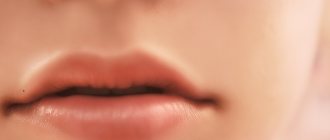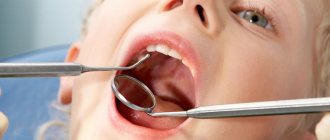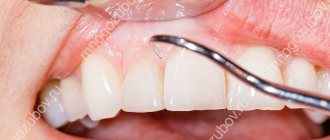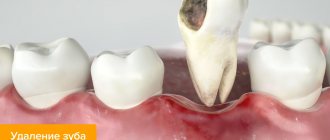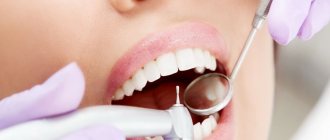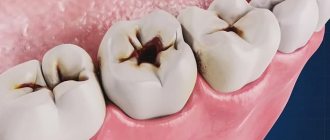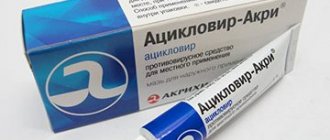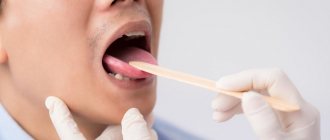Causes of herpes on the face, treatment, prevention
They say about herpes: “small but vicious.”
After all, the size of the lesion is small, but subjectively it is very disturbing. Many of us have asked the question: “Which doctor should we contact to treat herpes on the lips in order to get rid of the disease once and for all?” – because this disease can recur more than once, appearing at the most inopportune moment. Herpes is a viral disease that manifests itself in small infiltrates that develop into vesicles (cavities with liquid). The symptoms of herpes simplex infection are too typical not to recognize the painful blisters that torment a person for several days. Theoretically, pathology can develop on any part of the skin of the human body. But most often the virus “loves” to infect:
- the mucous membrane of the lips is the area most often “visited” by the pathogen;
- the border of the mucous membrane of the lips and skin around the mouth;
- conjunctiva;
- cornea;
- external genitalia (both men and women).
Unfortunately, injections or pills have not yet been invented to prevent herpes. Therefore, you should study the information about it well in order to successfully fight the disease at the first signs of manifestation, and, if possible, prevent it. You should especially be wary of herpes on the lips of women in early pregnancy. Its presence means that a viral agent has entered the body of the expectant mother, which can affect the intrauterine development of the fetus.
Laboratory diagnosis of herpes
The insidiousness of this virus is that there are no signs of herpes for a long time. A person may not be aware of his infection until the first vesicle appears on the lips.
But it is quite easy to detect it in a laboratory. For this, the PCR (polymerase chain reaction) method is used, which detects even a small amount of viral particles in biological material. It is suitable for early diagnosis, as it allows diagnosing the disease regardless of the timing of infection, even when the body has not developed an immune response [3].
If you examine antibodies, the enzyme-linked immunosorbent assay (ELISA) is considered the most reliable. The body of the infected person begins to produce protective immunoglobulins G and M. IgM antibodies appear immediately after infection, and IgG antibodies are formed only after the first relapse.
Tests establish the presence of the virus and determine which of the two types it belongs to [4, 5].
Factors causing the disease
The herpes virus may be present in our body, but not manifest itself. The disease begins to develop under certain factors - the virus is activated. The reasons for the appearance of herpes on the face are the same as the reasons for the appearance of herpetic blisters on other areas of the skin:
- hypothermia;
- violation of work and rest schedules;
- hypovitaminosis (regardless of the time of year);
- fatigue;
- chronic disorders of the immune system.
For relapses, it is also important that a periodically ill person does not attach importance to herpes and lets everything take its course, each time expecting that “it will go away on its own.”
Provoking factors
As already mentioned, fever on the lips does not always appear when infected with the herpes virus. The microorganism becomes active and causes skin manifestations when exposed to the following factors:
- frequent colds;
- hypothermia (especially after being in a hot room);
- intoxication;
- excessive exposure to the sun;
- nervous tension;
- pregnancy complicated by toxicosis;
- coffee abuse;
- following a too strict diet, malnutrition;
- avitaminosis;
- smoking and drinking alcohol.
All of the above factors lead to a weakened immune system. As a result, the virus is activated, and external manifestations of herpes infection occur.
Symptoms of herpes simplex infection
There are few signs of herpes, but they are all very characteristic. Therefore, difficulties in differential diagnosis almost never arise.
The main symptoms of infection with herpes simplex, which is the most common form of herpetic lesions, are as follows:
- painful tissue swelling appears in the affected area;
- after 1-2 days it transforms into a denser infiltrate;
- the infiltrate turns into a bubble with liquid;
- the blister bursts and a painful ulcer forms in its place;
- the ulceration dries out and is covered with a new layer of epithelium - the wound heals.
The way lips look after herpes is the same as after any other skin disease: the swelling disappears, but the ulcer cannot heal for some time. It is covered with a yellowish film that constantly “peels off” from the wound surface, thereby exposing the wound and delaying the process of epithelial regeneration at the site of the lesion.
Requires sacrifices
It is better to avoid decorative cosmetics (lipstick, lip gloss). They dry out the lips and, in addition, can spread the infection to other places. To hide defects on the lip, it is better to use a pharmaceutical antiherpetic patch. But if you simply cannot imagine yourself without cosmetics, at least take the product with a cotton swab and immediately dispose of it after application. But it is better to use lip balms containing petroleum jelly and allantoin to moisturize and soften herpetic sores.
Also, during illness, it is better to abandon contact lenses and replace them with glasses. This will reduce the risk of inflammation of the cornea of the eye - herpetic keratitis, which can even threaten blindness.
It is believed (although this has not been proven) that a special diet helps reduce the incidence of herpes. You should limit, or better yet completely avoid, foods that contain large amounts of arginine: beef, nuts, chocolate, raisins and all flour products. Fatty and salty foods and sweet carbonated and caffeine-containing drinks are undesirable at this time. On the contrary, foods rich in l-lysine (an antagonist of arginine) are useful during this period. These include boiled or baked potatoes, dairy products, boiled pork, lamb and poultry, egg whites, soybeans, lentils, fish, fruits and vegetables. For drinks, preference should be given to pure water and tea without sugar (the body requires at least 1.5-2 liters of liquid per day).
Well, the last sacrifice that will be required during the treatment of an exacerbation of herpes is a temporary refusal from sex (as a last resort, you should use a condom and refrain from kissing).
Diagnosis of the disease
Herpetic blisters look so characteristic that they cannot be confused with the morphological signs of other diseases - neither with an abscess, nor with specific ulcerations, nor with an allergic rash. In the vast majority of cases, the diagnosis is made on the basis of clinical manifestations.
A blood test for antibodies to the herpes simplex virus is an indirect method of identifying the pathogen in the body. It can be used if the body’s reactivity (the intensity of the response to external harmful agents) is low, and the infiltrate does not develop into characteristic blisters, which raises the question among clinicians: is it herpes?
Herpes simplex, which is manifested purely by a rash on the face, should be distinguished from herpes type 6, which is characterized not only by a rash, but also by a sharp increase in temperature.
Herpes virus
Lip fever is caused by herpes simplex virus type 1. About 80-90% of people are carriers of it, since the infection is very easily transmitted. However, this microorganism does not cause skin rashes in everyone. The virus becomes active only in the presence of additional unfavorable factors.
Many patients are interested in the question: “How to cure lip fever?” Currently, there is no drug that can destroy the causative agent of the disease. Once it enters the body, the virus invades cellular structures and remains there forever. However, with the help of drug therapy, it is possible to suppress the activity of the pathogen. And then the symptoms of the disease disappear. But the virus remains in the body, and fever on the lips may reappear when immunity decreases.
How to get rid of constantly appearing herpes on the lips
Herpes is the competence of a dermatovenerologist. Only a qualified doctor can tell you how to treat different types of herpes, taking into account:
- characteristics of the immune system of a particular person;
- the degree of weakening of the body at the time of the disease;
- tendency to relapse.
Medicines that are used for herpes on the lips:
- antiviral drugs in the form of ointments and gels (acyclovir, herperax);
- immunomodulators that increase the body's resistance (cycloferon, arbidol);
- at the stage of herpetic ulcers - softening balms with Vaseline and allantoin.
Many people wonder how to quickly cure colds on the lips in adults in 1 day (based on analogies with the influenza virus, colds on the lips mean a herpetic rash). Answer: if the process has developed beyond the infiltration stage, no way. The vesicle must go the entire way from its appearance to self-opening, the formation of a wound surface and its healing, and this will take an average of 2-3-4 days. An ointment for colds on the lips that would speed up this process has not yet been invented.
But if you just feel characteristic pain and notice swelling, physiotherapy methods (UHF, microwave) can contribute to the reverse development of the infiltrate, and it does not transform into an ugly bubble that spoils the anatomical aesthetics.
Medicine for herpes on the lips of a child should be used strictly according to the doctor’s instructions - regardless of whether this concerns immunomodulators or antiviral drugs.
You can read more about what treatment methods are used for herpes on our clinic’s website
Herpes and personal life.
Herpes does not in any way affect a person’s life expectancy, but it causes him suffering: physical and moral. An exacerbation can reduce performance, even provoke depression. Unfortunately, herpes is incurable. For some it worsens more often, for others less often: it all depends on the state of a person’s immunity. But with proper treatment prescribed by a gynecologist, there is a high probability that the disease will recur much less frequently.
Genital herpes negatively affects your personal life. The patient is tormented by thoughts that he could infect his partner. He is haunted by fears of being abandoned, abandoned. Doctors recommend not having sexual intercourse during an exacerbation and using modern antiviral drugs - then the risk of infecting a healthy partner is significantly reduced.
Prevention
The secrets of prevention, how to get rid of constantly appearing herpes on the lips and reduce the possibility of its recurrence, are quite simple:
- according to all the rules, cure fresh herpetic rashes using antiviral and drying ointments;
- strengthen the immune system with the help of immunomodulators, vitamin therapy;
- Do not touch shared utensils with your lips without treating them additionally.
If your partner has herpes, personal relationships also need to be adjusted to preventive measures - in other words, avoid kissing (not only on the affected lips, but also on intimate places where genital herpes can develop. Even if the herpes “only popped up” on the lips – it is possible that the pathogen may be on the mucous membrane of the genital organs, although their morphological changes have not yet been observed).
Knowing how the herpes virus type 6 is transmitted in children (and it is transmitted through breastfeeding and through saliva, most often from the mother), it can be prevented as follows:
- if you suspect you have a disease, do not kiss your child;
- do not give water to your child from your own mug;
- stop breastfeeding;
- Do not “clean” a baby’s dropped pacifier or pacifier in a quick way by sucking it in your mouth (an archaic method that, nevertheless, for some reason has taken root among mothers).
Related services: Consultation with a dermatologist Dermatovenereology
ethnoscience
Folk remedies for lip fever should be used together with antiviral tablets and ointments. Before using them, you should consult your doctor. The following home remedies are recommended:
- Applying ice. This remedy is effective in the first days of the disease, when there is redness of the skin, but there are no blisters yet. It is useful to make ice from chamomile infusion. The compress is applied to the reddened area for 15-20 minutes.
- Kalanchoe. The juice is squeezed out of the plant leaf and the rashes are treated with it several times a day.
- Brewing tea. Brew 3 tablespoons of black tea in a glass of boiling water. This product should be used to moisten the rash. Tea has anti-inflammatory and antiviral effects.
- Lemon. You need to squeeze the juice out of the fruit and apply it to the rash. Lemon acts as an antipruritic.
Treatment of herpes
We all know that there are traditional and medical methods for treating herpes. What to choose is up to you, but a more reliable solution would be to visit a doctor. A dermatologist or immunologist will help you identify the problem if you have not done so yourself and prescribe appropriate treatment.
Personally, I have never had to suffer from herpes, but I remember how my student friend had a difficult time with it. Herpes often manifested itself not only from diseases, but also from simple drafts. But the problem was not new to him, and therefore he knew what had to be done.
First of all, drug treatment - suitable tablets for herpes, which the doctor had previously prescribed to him. In addition, he treated the problem area of the skin with an ointment, which helped quickly eliminate the symptoms and protect the skin from unnecessary damage.
This is because this is precisely the general treatment regimen, when the patient is prescribed an integrated approach. This works well in the initial stages when symptoms are still mild. In advanced cases, consulting a doctor is already necessary.
How the disease develops
Once entering the human body, herpes simplex viruses persist (stay) in it for life, causing diseases characterized by a variety of clinical manifestations. Most often, herpes occurs on the lips and mucous membranes of the genitals.
When transmitting an infection, pathogens are fixed on the cells of the mucous membrane and the red border of the lips. Next, the viruses penetrate the cells, where after 2 hours they begin to multiply. Peak reproduction is recorded after 8 hours. This period is called the incubation or prodrome period. Some patients feel weakness and malaise, and a tingling and burning sensation appears on the lip.
After 18 hours, pathogens penetrate into the intercellular space, lymphatic system and blood, where they remain in a free state for 2 to 4 hours. When new cells are damaged, a characteristic rash appears on the lips in the form of blisters filled with liquid.
If HSV is completely destroyed, recovery occurs. Otherwise, the remaining part of them penetrates along the nerve fibers into the paravertebral ganglia, where the reproduction of viral particles slows down, and the person himself becomes a lifelong carrier of the infection. Specific antibodies appear in the blood, the protective titer of which inhibits the development of herpes infection. In adults it reaches 90%. The development of the disease in young children is inhibited by passive maternal immunity.
Rice. 3. The photo shows herpes on the lips. On a slightly swollen and reddened base, one or more blisters appear filled with clear liquid.
Rice. 4. 2 days after the appearance, the blisters burst and ulcers form in their place. This period is the most contagious.
Rice. 5. Deprived of liquid, the blisters dry out and become crusty. If you forcefully remove the crusts, bleeding occurs.
